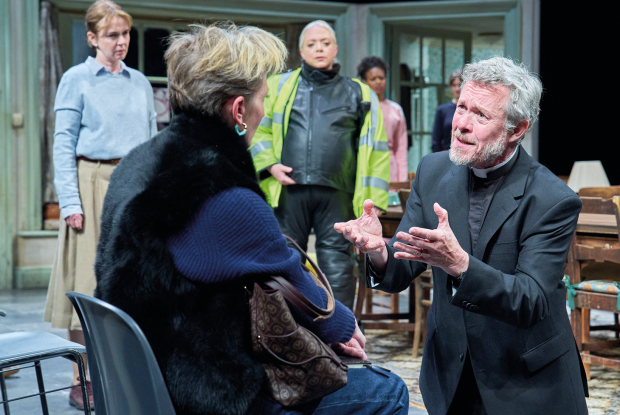Experts are concerned that Alan Ayckbourn’s plays may soon face extinction. Fewer than 80 of these precious beasts still exist in their natural habitat, so theatre-goers will be cheered to know that the National Theatre has created a genetically identical replica and released it into the wild. Rules for Living, fashioned by Sam Holcroft from the Acykbourn blueprint, is a bourgeois natter-fest in which bickering couples meet for a fractious Christmas summit. The characters are a bit nice and a bit nasty. Stephen Mangan plays a failed cricket star married to a soak in a frock. They have an only child who suffers from this year’s must-have mental disorder. The brother-in-law, represented by Miles Jupp, is an amiable podge whose hysterical lummox of a wife is a resting actress with a desperately needy personality. Deborah Findlay dominates the action as a glaring snoot married to a ruined baldie whose severe Alzheimer’s makes for uncomfortable comedy. (Surely not gaga gags at the NT?)
The emotional palette is varied with a handful of humdrum vices. He smokes, she boozes, he overeats, she’s insecure, he’s embittered, she’s a snob. The performances suit the beige material. Mangan gives us his usual impersonation of a country solicitor pointlessly burdened with Byronesque looks. Findlay patrols the kitchen tetchily like a 40-watt Catherine the Great. Maggie Service finds all the irritating exuberance in her character, but nothing else because there’s nothing else to find. Bemused twerp Jupp does his bemused twerp act. Nice work all round. No complaints.
The play’s claim to fame is an on-stage leaderboard which keeps the score as the characters carry out facile conversational pranks. Putting on an accent. Eating cake while telling a joke. Cleaning angrily. Stuff like that. My guess is that director Marianne Elliott realised this moribund novelty was limiting rather than illuminating but instead of scrapping it she took the passive-aggressive route and drew attention to it with honking sirens and flashing lights. It’s less obtrusive than it might be. The slender plot hits the buffers with five minutes to go and the play ends with the tamest food fight you’ve ever seen. The cast are clearly under orders to minimise the laundry bills by slinging the grub as sedately as possible. And it’s hard to believe that these squeaky-clean Home Counties types would get ballistic with the plum duff. So what’s going on? The show marks the end of Nicholas Hytner’s reign at the NT and there’s a hint of sod-you glibness about this farewell. Why a Christmas play at Easter? Why a TV sitcom with touches of Ionesco? Why a poorly motivated orgy of hurled pud at the end? The National should aim higher than the village hall. Sam Holcroft’s script is witty and has flourishes of real subtlety that would benefit from straight handling rather than experimental absurdism.
Spend Spend Spend is a 1998 musical about Yorkshire lass Viv Nicholson, whose husband won the pools in 1961. The madcap narrative feels as familiar as a crash-and-burn horror story from the Premiership. It opens with no-hopers in slums living on tick (credit), and dreaming of untold wealth. When it arrives it brings nothing but destruction. Writers Steve Brown and Justine Green make the strange decision to start with Viv looking back on her life from settled maturity. So the happy ending is signalled in advance. Bang goes any suspense. The £152,000 jackpot seems paltry today, so it would help to know that a coal miner in 1961 would have had to work for half a millennium to amass a comparable haul.
Once the dosh hits Viv’s wallet, the fun begins. The Nicholsons are dim, greedy, improvident and wildly hedonistic but they’re also warm-hearted and a good laugh so it’s easy to join them for the ride (while mentally ticking them off for each fresh extravagance). A posh accountant warns them against sponging relatives and sly neighbours peddling sob stories. So they start writing fat cheques for sponging relatives and sly neighbours. Every night they throw a champagne party for wastrel groupies in their spanking new mansion. Save? Invest? Plan ahead? No, no. They blow the lot with concentrated innocence. Christian Durham directs this tragicomic material with style and assurance. The simple lighting is highly effective and the complex ensemble singing is done faultlessly. Great dancing, too, in a tricky performing area which is broken up by vertical girders. The production values are high enough for the West End. So what could lift the show skyward? Celebrity, in a word. It needs a broken star from Corrie or Enders bidding for a comeback in a morality tale about destitution. That’d nab the tabloids’ interest.
Got something to add? Join the discussion and comment below.
Get 10 issues for just $10
Subscribe to The Spectator Australia today for the next 10 magazine issues, plus full online access, for just $10.
You might disagree with half of it, but you’ll enjoy reading all of it. Try your first month for free, then just $2 a week for the remainder of your first year.














Comments
Don't miss out
Join the conversation with other Spectator Australia readers. Subscribe to leave a comment.
SUBSCRIBEAlready a subscriber? Log in